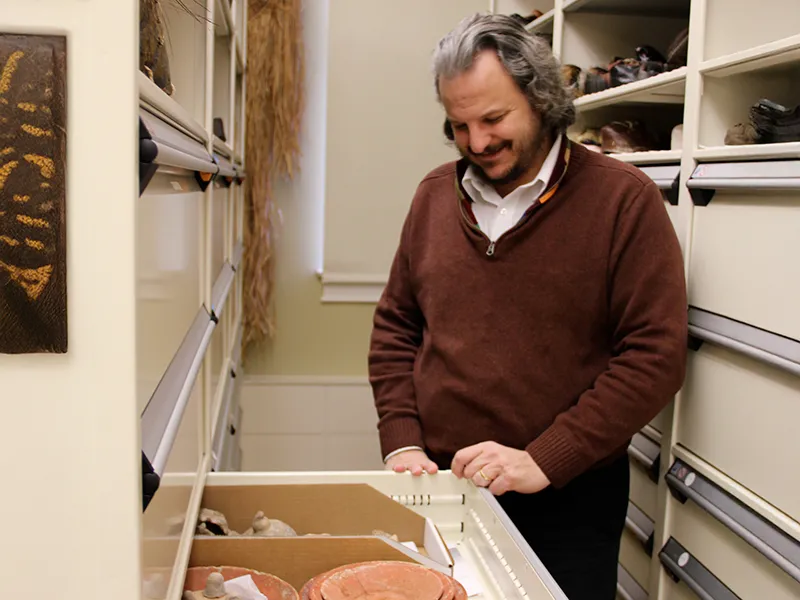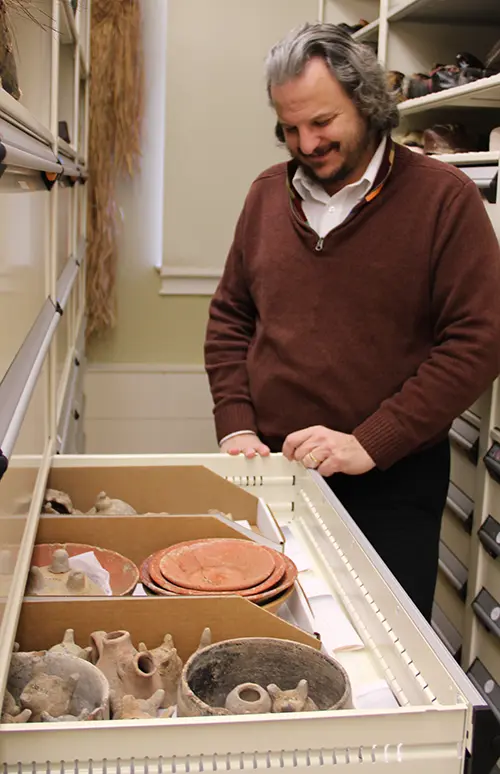
Celebrating a Centennial of Indigenous American Study
Originally published in the 2024 issue of the School of Liberal Arts Magazine

A hundred years later, what has been the effect of a donor's gift? The Middle American Research Institute (MARI) has been conducting and sponsoring influential ethnographic, historical, linguistic, and archaeological research in Mexico, Guatemala, Honduras, Belize, and El Salvador since its establishment in 1924. Through field research, publication, student training, and the establishment of a world-renowned museum collection. MARI has made a significant impact on the scholarship of indigenous cultures of Middle America. Thanks to the tireless efforts of innumerable scholars, the Institute has consolidated its status amongst the most esteemed research institutes focusing on indigenous Middle America.
“A century ago, Tulane acknowledged that Indigenous America had a complex and rich history that was important and worthy of serious and targeted academic interest,” said Marcello A. Canuto, MARI director and Tulane archaeologist, who specializes in Maya archaeology. “Thanks to a significant donation, Tulane founded the Middle American Research Institute to advance the study of indigenous America in Mexico, Central America, and the Caribbean. As MARI marks its centennial, we will continue our commitment to the study of ancient indigenous American peoples and their accomplishments.” - MARCELLO CANUTO
A Timeline of MARI’s History
1924
Thanks to an endowment from Samuel Zemurray, Tulane establishes the Department of Middle American Research (later renamed MARI) to house the William Edmund Gate’s library, which eventually seeded the creation of the Latin American Library decades later. William Gates becomes the Institute’s first director.
1926
Frans Blom becomes the Institute’s second director.
1933
Frans Blom travels with a team to Uxmal, Yucatán, to make molds of the Nunnery Quadrangle architectural complex. The molds were displayed at the 1933 Chicago Century of Progress Exposition (World’s Fair), exhibiting the zenith of late Maya art and architecture to an eager United States public for the first time.
1930's
MARI participates in the first aerial survey of the Maya region.
1938
With a growing anthropological collection, an expanded library, and a new publication series, the Department of Middle American Research changes its name to the Middle American Research Institute.
1942
Robert Wauchope becomes MARI’s third director.
1947
Robert Wauchope becomes a member of the Committee on Latin American Studies at Tulane to develop an educational program on Latin American Studies in collaboration with Vanderbilt, University of Texas, and North Carolina. This initiative eventually gives birth to the Stone Center for Latin American Studies.
1970s
E. Wyllys Andrews V becomes MARI’s fourth director.
1980
Roland Scott Hall endowment is established to support MARI’s research initiatives.
1983
Robert Wauchope endowment is established for publications in Middle American Anthropology in MARI.
1990's
MARI Director E. Wyllys Andrews V directs the Copán Acropolis Archaeological Project. Copán is one of the most important archaeological complexes in the ancient Maya world, and the long-running project sparks important breakthroughs involving dynastic sequences, epigraphy, and chronologies.
2009
Marcello A. Canuto becomes the Institute’s fifth director.
2012
Maria Luisa De Ajubita Franklin Endowed Fund at MARI is established for graduate students in Anthropology to conduct field research in Mexico and Central America.
2013
Yvonne Effinger celebrates the remarkable impact a MARI education had on the life of her husband, Lt. Col. Clinton “Clint” Effinger III, by making a gift to enhance the stewardship of its artifact collections. With her support, priceless historical collections, including Aleutian objects donated by Clint, are protected from damaging UV and infrared light — securing them for generations of future scholars.
2019
A gift from the Hitz Foundation helps create MARI’s Geographic Information Systems (GIS) Lab, which analyzes and computes archeological data. This lab uses lidar remote sensing technology, which enables MARI to gather highly precise data over large vegetation-covered areas, uncovering exciting new discoveries. MARI Director Marcello A. Canuto and Tulane Research Professor Francisco Estrada-Belli were part of a team that discovered dozens of ancient cities in Guatemala, including some 60,000 structures, with this innovative technology.
2024
The Hitz Foundation builds upon its previous cutting-edge grant with a $1.5 million gift, further increasing the ability of MARI’s GIS Lab to use lidar technology to conduct archaeological research. Thanks in part to the forward-thinking philanthropy of the Hitz Foundation, MARI became an early leader in this mapmaking technology.
The Clinton and Yvonne Effinger Excellence Endowed Fund was created by their family to help MARI build on its century of trailblazing scholarship and lead the way in Maya archaeology for another 100 years.
2024 / 2025
MARI begins a new collaboration with the Universidad del Valle and the US State Department to systematically train members of various community-based forestry concessions in the Maya Biosphere Reserve (MBR) of Guatemala to conduct archeological resource management using modern technology. Community members will be trained to use lidar data, digital maps, and advanced survey methods to record archaeological sites in two different forestry concessions. With these tools, local stakeholders will be able to accurately and efficiently record cultural resources in their concessions. Aside from boosting the archaeological understanding of this understudied portion of the MBR, this training will also allow local communities to examine and report on the amount and impact of looting on the cultural resources located in their concessions. This partnership of archaeologists, government officials, and local stakeholders is unique to the MBR and will result in a protocol for long-term preventive protection measures, as well as the formation of a cadre of technicians trained to register and evaluate cultural heritage. This project is designed to be scalable and transferable to other forest concessions in the MBR.

